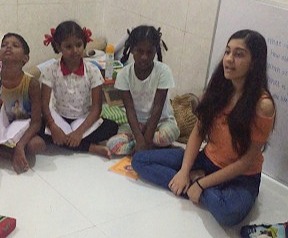Ayesha Khan| Toronto, Canada
As we continue to grapple with the far-reaching effects of COVID-19 on our daily lives, we must not forget about the children who are now deprived of their education after years of progress in making education accessible. As of March 2020, UNESCO reported the grim reality that half of the world’s school population is not attending school. Globally, a large part of a child’s future is directly dependent on the quality and quantity of education he or she completes. Education acts as a bridge to economic prosperity, healthy living and a stronger society.
Gender, class and nationality were always factors that prevented children from the education they deserve, however, amid the pandemic, these obstacles are heightened. Although the future of underprivileged children looks very uncertain right now, I want to focus on the unsung heroes who created progress for educational equality before the pandemic. Meet Aamyneh Mecklai, an incredible young activist in Mumbai, India changing the lives of underprivileged children through education and verbal literacy. Her story, initiative, and passion is a testament to the power of youth to change the deeply-rooted and often unwavering issues in society. Her work is exactly why governments around the world need to refocus their attention on educational equality as soon as the pandemic slows down.
I had the chance to interview Aamyneh about her non-profit organization, Speak to Lead, and the impact of her work on her community.
Tell me a little bit about yourself.
Hi! My name is Aamyneh (pronounced: aah-min-ay) and I’m from Mumbai, India. This fall, I will be studying at the University of Toronto as one of thirty-eight Lester B. Pearson Scholars from around the world. I hope to study Economics & Finance at Rotman Commerce and in the future, I aspire to leverage economics, education, and social entrepreneurship to help create equality in educational opportunity for students from low-income families across the world. Aside from my longer-range goals, I enjoy playing the piano, dancing ballet, reading postmodernism literature, and writing!
What is Speak to Lead?
In 2018, I founded ‘Speak To Lead,’ through which I teach conversational English, global awareness, and public speaking skills to students from low-income families enrolled at government-run schools to help students think critically, globally, and inquisitively. My engagement reiterated the disparities between government-funded and private schooling. Largely, my goal is to transform the landscape of government-funded education in India. While the Indian Right To Education Act, 2009 has improved enrollment rates and the gender-parity index, it has not contributed to student engagement or prescribed a learning-outcome oriented curriculum. ‘Speak To Lead’ birthed an extraordinary family of 300 (and counting!) students united not by income-brackets or race or background or language, but by their determined pursuit of knowledge: a desire to speak in order to lead.

Interestingly enough, the seed for this initiative was sowed when I was offered an internship at a law firm in Pune, India. During my time in Pune, I volunteered to spend early mornings observing and assisting teachers at non-profits and municipality schools.
In particular, I observed eighth grade English classes: students sat listlessly on benches, a teacher read lines from a textbook which was vacuously copied into notebooks. Throughout the class, no hands were raised, no questions were asked, no dialogue was initiated—no curiosity was sparked. It was entirely different from my high school's classroom culture, where I was encouraged to share my skepticism, conjecture on Edgar Allen Poe's Tell Tale Heart and improve school leadership.
I wanted each student to have the opportunity to develop their ability to speak confidently, and in turn, to lead confidently.
Why is educational equality so important for our society?
The obvious answer to this is that the ideal of equality in educational opportunity will afford long-term equality and will ultimately render an increasingly productive workforce that is more representative of diverse ethnicities, age groups, genders, races, and languages. While I agree with this wholeheartedly, I also think that every child, regardless of age, gender, income, or race, should have the opportunity to learn and more importantly, to question.
A single twisted sign at the end of a phrase can unfurl a world of possibilities. It can empower and disempower. It can reinforce and challenge. Through Speak To Lead, we hope to equip our students with a magically limitless tool that every child should have access to—the ability to learn, question, and reinvent.
How is your organization addressing educational inequality, especially for girls?
The first organization I ever worked with was Anjuman-I-Islam. Anjuman-I-Islam was founded in 1874 by a small group of Muslims lead by Dr. Badruddin Tyabji, the Third President of Indian National Congress and the First Acting Indian Chief Justice of Bombay High Court, with a ‘desire to see the Muslim Community advance in education and social standing’. With 90 institutions across India, I was privileged enough to work with their Pune branch. I worked with 90 girls over two months.
Together, we debated government initiatives, discussed the role of the United Nations, and learned about people like Malala Yousafzai. By the fourth session, teachers at Anjuman-I-Islam sat in on my classes and took notes to build parts of my module into their school curriculum.
My first students at Anjuman-I-Islam, a group of 90 girls, became the primary catalyst for Speak To Lead. I hoped to encourage them, never realizing that in turn and perhaps inadvertently, their drive and determination had encouraged me to go back to Mumbai and begin what was soon known as Speak To Lead.
Did you face any obstacles while starting up and running your organization?
Definitely. In the run-up to my first batch of students, I remember writing out emails to seven Indian non-profit organizations with comprehensive teaching plans and personalized teaching material, my résumé and motivations for this initiative, and an infographic summarizing the ways in which I was offering more than the conventional school curriculum.
I soon realized that refreshing my email inbox every half-hour would not produce any response from the organizations I had pursued. So, I began to ‘cold-call’ these organizations. Weeks later, I got a single response offering me an interview. My age and the lack of a bachelor's in education were two primary barriers that kept me from prospective classrooms of students. Within this interview, I was given the opportunity to pitch my idea—of helping students learn beyond the pages of textbooks—to parents at a parent-teacher meeting. “If you get twelve parents to sign their kids up for your extra Saturday class, we’ll give you access to the space and students.”
During the parent-teacher meeting, I pitched my idea in two languages, Hindi and English, and justified how my age was a strength rather than a weakness for my role as an educator. That day, every single parent at the meeting signed their child up for my classes. I had a batch of fifty enrolled students, which soon grew to seventy-five. Today, I am working with over 300 students and am partnering with three new organizations to increase our student body.
In summary, your age does not have to be a barrier. With persistent drive and determination, being young and relatively new to an area of knowledge or professional field is not always a barrier—sometimes, it can be a bridge.
Who inspires you?
I am fortunate enough to be surrounded by inspiring women within my family. My paternal grandmother, an artist and resilient humanist, and my maternal grandmother, a social worker and multi-talented superwoman, and finally, my mother, an entrepreneurial trailblazer. Each of these women inspire me by example to ooze a confluence of creativity, empathy, and determination.
What message do you have to aspiring youth activists and change-makers who want to make a difference in their communities?
Identify a problem you wish to solve, brainstorm with your friends, find a solution and then, jump in! It took me several emails, several cold calls, and several passionate speeches (in both English and Hindi) to convince the people around me that I wanted to make a difference. Roughly three-hundred students and tie-ups with over four organizations later, a result I never expected, I am in pursuit of a life-long dream. Go forth and make a change—it is never too soon and never too late.
Get in touch with Aamyneh and Speak to Lead on Instagram @speak.to.lead and through email speak.lead.together@gmail.com
.png)

















